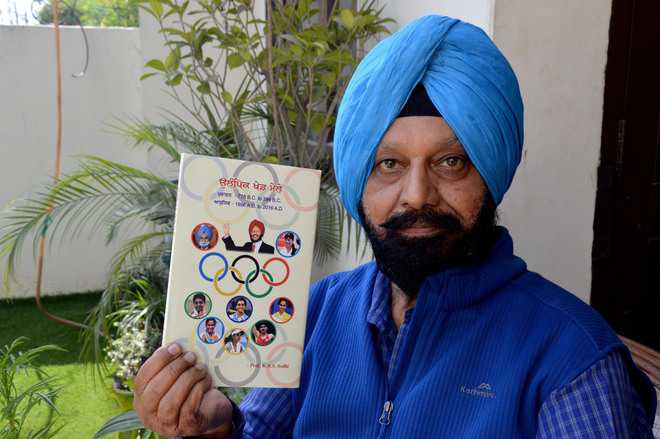City writer releases book on Indian Olympians
Minna Zutshi
Tribune News Service
Ludhiana, April 7
‘Citius’, ‘Altius’ and ‘Fortius’ that translates as ‘Swifter’, ‘Higher’, ‘Stronger’ in English has inspired and motivated the Olympians. The motto is known to have impelled sportspersons “to move to a higher level of being which is promoted by emulation and excellence”.
City-based writer and academician KBS Sodhi’s book “Olympic Khed Meley” discusses all this and much more. The book, dedicated to the “great Olympians of India who brought glory to the nation”, is an evocative story of the Olympic Games.
It delves into the history of the Ancient Olympic Games as well as the Modern Olympic Games – from 776 BC to 394 BC and from 1896 AD to 2016 AD. “It is interesting to note that even poets and artistes were part of the games in ancient times. The games find a mention in Greek philosopher Plato’s book Republic,” says Sodhi.
The author has devoted a chapter to the Indian heroes, including hockey wizard Dhyan Chand, Milkha Singh, PT Usha. Replete with facts and figures and anecdotes, too, the book is informative as well as analytical. The author touches upon the history of Olympic controversies with the same ease as he writes on Paralympics.
Unfortunately, India’s performance in the Olympic Games remains dismal, according to Sodhi. “At the 2016 Summer Olympics, India could get only a couple of medals. Only two women players – PV Sindhu (Badminton) and Sakshi Malik (Wrestling) – saved India from a total disgrace. Out of a 119-strong contingent, India got only a silver (Badminton) and a bronze (Wrestling).”
Analyzing the reasons for India’s poor record in the Olympic Games, Sodhi blames politicisation of sports in the country for the pitiable performance of the Indian sportspersons in international sports events. Special incentives should be provided to the young brigade interested in taking up sports, says the author, who has written eight books, including a Punjabi translation of John Milton’s ‘Paradise Lost’ and Alexander Pope’s ‘Rape of the Lock’.










